#highlight the frailties of his character or whatever
Text
Monkey King 2009 Episode 5
NO.
GENERALS!!!
I JUST STARTED TO BELIEVE IN YOU
a lot - and I mean a lot - happened this episode. but I'm mad about THIS.
#mhw09 personal#these absolute rat bastards#they nearly incited an actual mob against him what the hell#blaming stone monkey for literally everything from their OWN terrible preparations and lack of fortifications#to the MONKEY KING'S own tactical decisions#these GUYS#one kid is a sacrificial lamb the other is a scapegoat#NONE of you deserve EITHER of them#look I totally recognize that this episode was supposed to sort of be six ears's 'start of darkness'#highlight the frailties of his character or whatever#but look. the kids aren't getting blamed for a single thing until the adults get knocked down about twenty pegs.#six ears has been trained to 'prove himself'#but has been given poorly defined and ever-shifting expectations for a vaguely-dangled-but-never-stated 'goal' (of monkey king)#of course he leaps at any sign of approval#he's hungry to know what the hell he's supposed to be doing and that he's doing whatever that is right#he tries to set the record straight multiple times and eventually gives up#and yeah he enjoys the praise but he's also anxious he hasn't earned it so he immediately jumps at being the one to bring in the NEXT batch#make it 'real' or 'fair' so that him taking FALSE credit never happened actually it was just a little early#yes it's disingenuous and not fair to Stone Monkey#but he's being a kid#I wonder (if he hadn't FALLEN OFF A CLIFF what the hell six ears) if he might have had an attack of conscience#if he HAD found reishi mushrooms and shoved them angrily at stone monkey and made him take them back#I can see that in him#I feel that's a distinct possibility for his character - HE knows he did a bad and it's bothering him severely even if he doesn't admit it#(his angry grumbling while he tries to find the mushrooms)#so I feel like the guilt would eat him alive eventually#even if he didn't he'd probably crack and confess the whole thing to Stone Monkey within a week#also also stone monkey was SO CUTE we finally had a ton of dialogue from him and everyone else! but he was also! so sad!#seeing him happy by himself when he first set off on his own to find the reishi mushrooms was so bittersweet#stone monkey prior to the troop was lonely sure but he wasn't unhappy. no excuse for how he was treated this episode.
1 note
·
View note
Text
The maid and the Cat, Ren and Akira: some musings
What gloomy love brightened the half-lives of the Sohmas’ most Cursed ones?
I often wonder what the relationship between the former Cat and his attendant would have looked like, twisted and sad as it must have been. Precious little is shown about those two, and only through Kazuma’s pov. We know she took care of and pitied the Cat, to the point that she even slept with him and bore his child. This is not unlike Kureno’s relationship with Akito. She might have treated him with the same kindness and devotion, distant, perhaps harmful, yet selfless.
Selfless? I think another way to extrapolate on the story of Kazuma’s grandparents is with Ren and Akira’s relationship.
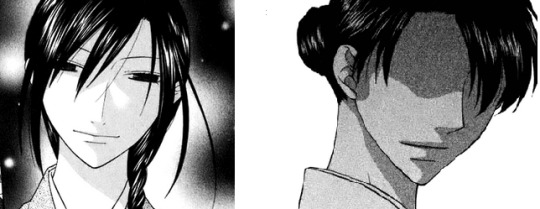
Many great meta writers have already pointed out that those who fill in the positions at the extremes of the Sohma hierarchy, the Cat and God, or in this case the Cat and the idolized, deified family head, are foils to each other and are the ones that are dehumanized and isolated the most.
But now I think that you can also compare the way the previous Cat and Akira both chose ("chose" being a relative term in the case of the Cat) a romantic partner.
(Akira wasn’t God, but as the family head, he was worshipped just like Akito. His sickness also contributed to making him stand apart. Not only was he kept inside the compound because of his frailty, the hold that death had on him blessed him with this ephemeral, divine aura. “Was it the sorrow that befell him at such a young age that gave him that otherworldly beauty?»)
Both Kazuma’s grandfather and Akito’s father were doomed, Akira to die an early death, Kazuma’s grandfather to live the life of a living dead. Both were buried alive in the Sohma estate, either at the outskirts or at the center of it.
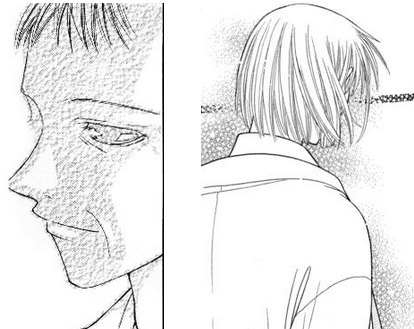
Both reached out to their progeny. (But Kazuma rejected the offered cake, and will endeavour to atone and honour his grandfather’s memory. Akito clung to every memento she had of her father and will need to learn to let go of him.)
And both the previous Cat and Akira found some measure of comfort in the affections and arms of their female caretakers, Sohma servants who saw their loneliness and expressed their compassion, though not in a particularly healthy way: Kazuma’s grandmother acting out of pity, Ren out of obsessive love.
It’s interesting to me how their respective position was reflected in their partners’ feelings : the imprisoned, despised Cat, Kazuma’s grandmother looked down on. The respected, otherworldly beautiful Akira was adored by Ren.
Kazuma sums up his grandparents’ relationship thusly:
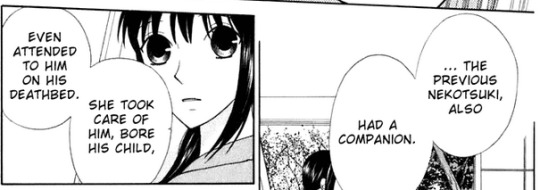
Those correspond to the main "duties" that a wife is traditionally supposed to provide her husband.
The day-to-day caring.
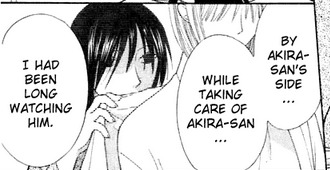
Childbearing.
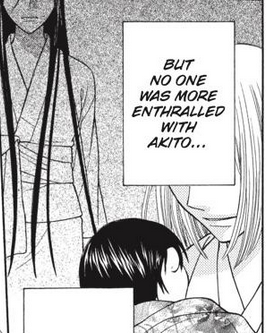
Attending their husband’s deathbed.
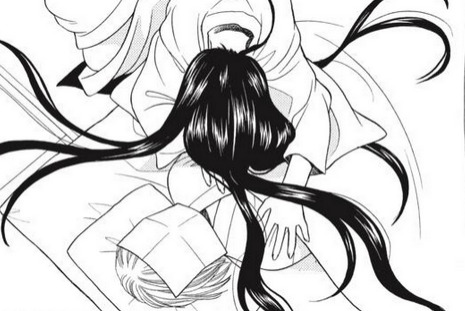
Obviously Ren wished she could have skipped the second one and be there for the last one. (I headcanon that she had prepared her last words years in advance, finding small pleasures and comfort, on the back of the wave of despair anticipating Akira’s death, in rehearsing the declarations of passionate love she would address to the dying man.)
The Cat’s companion attended her partner’s deathbed, seemingly very composed, even cold, as seen in Kazuma’s memories, while Ren, deprived of her husband’s last moments, that she felt were “stolen” from her by Akito (in reality by the maids :@), was mad with grief.
"The only one who can save him"
Those parallels make me wonder whether or not the Cat’s companion might not have developed a saviour complex, like Ren, both believing that they were the only one able to save this lonely, condemned person they were taking care of, and relishing it.
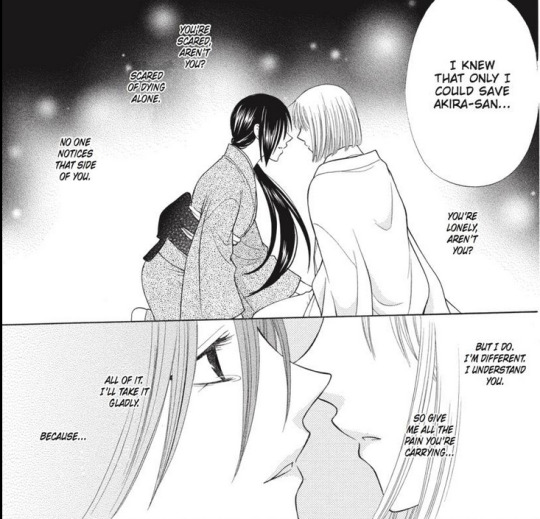
“I love you” vs "I pity you"
On Ren’s side though, it seems that she believes she truly saw Akira, as the person hiding behind that otherworldly aura, filled with sadness and fearful of death. Seeing that Akira agrees with her ("Ren noticed I was lonely"), fought against the Sohma leaders and regretted on his deathbed that he and Ren couldn’t reconcile, I believe this is not a delusion of hers. Her love was genuine and passionate, and she and Akira were happy. Unfortunately, that happiness didn’t survive her pregnancy, for she was also jealous and obsessed.
Kazuma supposes that his grandmother believed that she was doing something good. I wonder at her expression. It is shadowed, enigmatic. Is it a smirk or not, is she sad or not? i wonder whether she was selfless in her pity, like Kureno, or selfish like Kagura, perhaps feeling better by «sacrificing» herself in associating with the Cat for the sake of a miserable soul.
(Whatever you can say or imagine about her, Kazuma doesn’t seem to suffer from the stigma of being the Cat’s grandson, nor does he bear any trace of an abusive upbringing - in fact, he was among those doing the abusing - or even the echoes of the previous generation’s, so my guess is that she was an okay mother and grandmother... which would have made Kazuma’s disappointment and hurt at her words all the sharper... Like Tohru thinking of the zodiacs members she finds so kind and adorable secretly looking down on someone else she realizes she cares about more than she thought.)
There is no way to know how the Cat reacted to a pity-love. But considering Kureno and Akito’s relationship, this might also have been but a superficial balm, and potentially just as hurtful. Then it depends on the interpretation. Kureno’s pity cocooned Akito and kept her from moving forward, but the Cat was condemned anyway to an eternity of imprisonment. Moving forward was forbidden to him. And if his self-worth was already completely destroyed as his role and his treatment are meant to do, he might have just felt grateful towards the attendant. There’s no way to say for sure whether he would have been hurt or not by the truth, and I don’t know which option is the saddest!
... but I know what could be sadder. Because is the maid entirely to blame? We know that in Fruits Basket, love requires a measure of selfishness. The one cursed with the Cat has no self, no existence, no wants and no future, and they accept this fate. They believe they deserve it. (Which is why the Cat's Room doesn't need bars in the manga, nor locks. Rin was under lock and keys because either Akito didn't completely trust her to keep her word or she didn't want someone to discover her.)
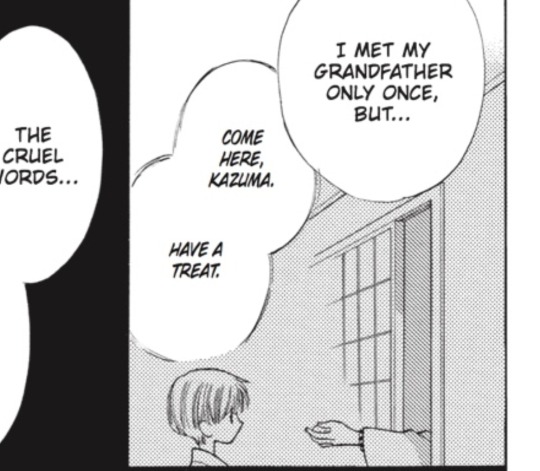
It would be very difficult for someone to fall in love with a person who has renounced to everything, perhaps including love. Because who's to say that the Cat loved the maid too?
Recognition vs indifference
How depressingly fitting that we don't even learn the Cat's name, while Akira’s is remembered by all and echoes back and forth in the later part of the story.
Ren marrying the Sohma family head was such a big political deal it provoked a family schism. The Cat’s story with the maid gets completely ignored. It is probably known, just not "officially recognized", says Kazuma. Like everything related to the Cat, it was relegated to the back of the minds, in the dusty closet of the things that are uncomfortable to think about but that you tolerate if it doesn’t upend your little world-view. Ugh, some maid is being inappropriate with that monster! Well, as long as she doesn’t free the loathsome creature, who cares. (And she wouldn’t, because she’s no Tohru.)
In contrast, the maids of the main family thought that Ren was stealing Akira from their grasp. Ren didn’t seem to care for the family, and in a way, her love allowed Akira to also escape from them, "snatched away" by "that woman”, for the old attendant. Unlike the Cat’s attendant, Ren felt like a threat to the Sohma strict hierarchical system. (Fortunately, God will be born to bring back the right order of things, phew! Certainly she he will accomplish what Akira-san was momentarily too misguided to do and rid us of that woman!)
Inheritance.
Both women's profession of their true feelings deeply marked their progeny and the way they view relationship, whether personal or not, romantic or filial.
While her mother affirmed that "a woman only needs one man", Akito leaned on the love of the zodiacs ; Kazuma viewed and loved Kyo as a human and dreaded that his son would find himself in the same situation as his grandfather but also with the same kind of companionship. (His reaction to Kagura speaks of a long-held anxiety). But Ren's hatred for Akito coloured the way Akito interpreted her words, while Kazuma’s grandmother’s declaration shook Kazuma, his personal relationship with his grandmother notwithstanding.
This comparison isn't about good or evil, neither to judge those characters. Furuba isn’t about that. Obviously, they are not blameless. But it is very difficult to say whether or not Kazuma’s grandmother was wrong to act out of pity if it provided a bit of comfort to a prisoner. And is it surprising that Ren developed this saviour’s complex when it seems she was the only one willing to breach Akira’s isolation bubble?
Anyway, Takaya-sensei is really good at making foils. Either because she does it on purpose or because her characters are so deeply intertwined with the themes of the series the parallels appear on their own. But in this case, I don’t think it’s for nothing that the chapters recounting Ren and the Cat’s attendant stories follow each other (chapters 114 and 115).
Of course, this meta is less an analysis and more suppositions and conjectures (frankly, I wonder if I might not as well have written a fanfic). From the little we see, the Cat’s companion and Ren work as distorted yin-yang mirrors, their differences highlighting the similarities of their situations, from the ugly effects of the inner workings of the Sohma cult to the messed up inner workings of the heart. Genuine but obsessed, jealous love... Pity, perhaps self-serving, in the guise of martyred love.... One thing I can say for sure is that these two both gave me chills in their own way.
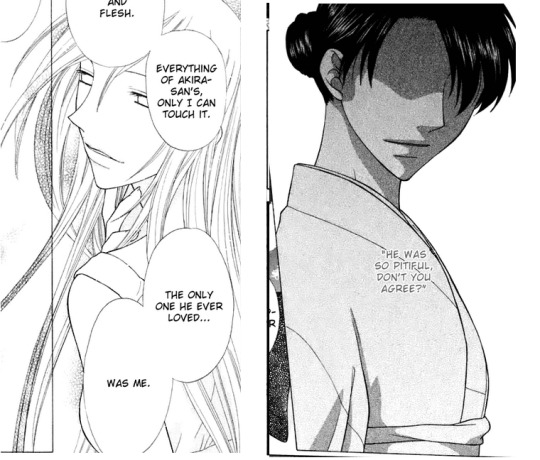
#ren sohma#cat's companion#the cat spirit#zodiacs#fruits basket#fruits basket manga#fruits basket season 3#fruits basket meta#love vs pity#meta#akito sohma#akira sohma#kazuma sohma
71 notes
·
View notes
Text
Dunkirk and The Sacred Humanism of Christopher Nolan

"You can almost see it from here."
"What?"
"Home."
As what I have come to expect from a Nolan film, Dunkirk is an entirely unique and profound experience. Although I'm not a war or history buff, Nolan's cinematic portrait of the struggle and survival of the men at Dunkirk is deeply moving and beautiful to behold. I could only describe the feeling as being like looking upon a painting of the Masters, which to some might not sound particularly inspiring, but coming from a visual artist like myself, means a lot. When studying a work of art from Rembrandt or El Greco or Da Vinci, what you noticed is the meticulous and intentional care in how they apply their brushstrokes, how the light and shadows create mood and atmosphere, and how they capture depth and meaning in what they choose to depict. It is the same while watching a Nolan film, and it was most certainly the case for Dunkirk.
It is his most visual film to date. Sparse in dialogue, the emotions and feelings that it evokes come mostly from the visuals - in what he chooses to show us and *not* show us, because both are equally important. Like for example, I loved how we never see the faces of the enemy. Even at the end with the capture of the pilot, they are just blurred shadows moving against the backdrop of a red sunset. This deliberate hiddenness conveys further the sense of ominous dread, with the enemy harassing them and the promise of death from all sides. There is also another reason why I think he chose to do this, of which I'll come to later.
In any case, Dunkirk is undoubtedly a masterpiece of filmmaking, with such a sense of sacredness underneath the desperation and horror. That was what struck me most, that love towards humanity and the sublimity of perseverance. The tension is extreme, to be sure. Nolan understands how to immerse his audience in any mood, and his creative and dexterous use of the timeline structure of the battle was done in a way only Nolan could do, but it was really the heart of the film that struck me first. I had heard much of Dunkirk even before I saw it, and one of the main themes of criticism was the lack of emotional investment in the characters and the events. I had quite the opposite reaction, however, feeling deeply for the characters and their predicament. I loved every one of the mini storylines, each bringing their own powerful emphasis on the human experience during war.

Straight away from the opening sequence where we meet our soulful main protagonist, I was drawn into their struggle to survive and get home. Probably my favorite storyline being the family on the boat, with what happens to George because of Cillian Murphy's character. It was so incredibly sad, but real and terrible – a heartrending portrait of the casualties of war – which aren't always on the battlefield and those killed aren't always soldiers. Not that I would know by any personal experience, but simply from an artistic point of view, I think it had a lot to say.
Yet each story and character had its own piece to say, and it spoke true. I had read that Nolan called this film a "survival story", and not a war film, and I believe that's exactly what this film is. Interestingly, I see some of the same themes carrying over from Interstellar. Dylan Thomas' poem which had such a pivotal place in that film, could have easily been used for Dunkirk! "Do not go gentle into that good night..." - is precisely the feeling you get as you watch this film, and are echoed in the words of Churchill by the end, "We shall fight on the beaches, we shall fight on the landing grounds, we shall fight in the fields and in the streets, we shall fight in the hills. We shall never surrender!' - "Rage, rage against the dying of the light!" Nolan's humanism is such a strong theme of his films, and made even more so through his rendering of this miraculous historical event. And this is where things get *really* interesting.
You see in all my reading of the criticisms leveled against Nolan's film, there is actually one piece of criticism that is strangely absent from any review that I've read, and it is one that I think is key in understanding why Nolan chose to tell Dunkirk as he did. It was actually my Mom who had pointed this out to me, that while it was certainly miraculous that the English people rallied together to rescue the men trapped upon those shores, it wasn't the *only* one that happened that day nor technically the most miraculous. There were actually a list of unexplained events that occurred which allowed the rescue attempt to even happen and succeed at all!
One: The timing of very poor weather conditions, which prevented much of the German approach from the air. And there was fog that developed between the Germans and the Allies which helped in obscuring them as well.
Two: Despite this turbulent weather all around them, somehow the beaches were quite calm, and the English Channel remained strangely still, which even on days of pleasant weather was very unusual! This enabled the swift and speedy passage of the civilian boats, who would not have handled well in extreme conditions otherwise.
Three: The mysterious decision that came from Hitler to stop the German advancement, despite having the Allies surrounded and at his mercy – the reasoning of which is still being discussed and researched today!
My Mom had expressed disappointment in not seeing any of these events play out, as these are considered all part of the miracle that happened that day. Which then raises a question, why did Nolan choose not to highlight any of these crucial facts? And in answering it, we see exactly what Nolan does so well (and what I love about him the most) – the creation of art from ideas themselves.
There are themes that he uses consistently in all of his movies which all stem from his secular humanistic ideas. As I mentioned, Interstellar shares this theme strongly with Dunkirk, as it was in that film that the bulk beings of the higher dimension are the evolved humanity which used the tesseract to save humanity in its past. As Cooper says, "But they didn't bring us here at all. We brought ourselves." - Interstellar was about Mankind saving itself, about human conquest over death, and the glory of humanity as an entity onto itself – with its one chief and noble feature being Love. In the same way, Nolan molds the events of Dunkirk through this lens. He intentionally strips everything down to a very narrow focus. The isolated, empty landscapes and shots, the lack of gore and blood, the focus on survival rather than the politics of the war - all these aspects distill the story down to its most basic idea: of people struggling together to overcome insurmountable odds, of people risking their lives so that others may come home. – Mankind’s love for Mankind. This is Nolan’s divinity.
This is why I believe he never lets us see the face of the enemy, even calling them "The Enemy" in the opening title cards – not the Germans. He doesn't name them, and he doesn't put a *human* face to them. This keeps any hostile connotation associated with the concept of humanity from being expressed in this film, which seeks to showcase the warm, brave and heroic human spirit of the English and French that day.
And so, for this reason, no mention of the strange occurrences of the weather are brought into the story either, because even during that time the English associated those miracles as an act of God. There was a National Day of Prayer on May 26th, just before all those anomalies occurred, and after Dunkirk, a Day of National Thanksgiving. Whatever you may believe about what had happened that day, it is clear what the English believed. It was then very crucial for Nolan's controlled narrative to not mention even an implied "higher power" gave rescue that day.
This attention to themes is also shown in the characters and their stories as well, where we see this ideal portrayal of humanity’s loves towards one another:
Peter and his father both show mercy on Cillian Murphy’s character by not burdening him with George’s death.
Peter gets George’s name in the newspaper as one of the heroes at Dunkirk.
Our protagonist stands up for the poor Frenchman during the scene with the soldiers trying to kick him off the sinking boat.
Commander Bolton selflessly stays back for the French.
All these moments and elements are crafted meticulously from the palette of Nolan’s ideas, and he paints a compelling picture of humanity, with all its frailties and all its strengths, with the absolute reverence of a Michelangelo. For Nolan understands the medium of ideas as deftly as a sculpture understands the stone, especially when being expressed through the visual language of film, and how an idea can become powerful and resilient within a story. So that in any one of his films, whether he is dealing with black holes or historical events, you must always ask yourself:"Are you watching closely?"
I would highly recommend watching Nerdwriter's The Prestige analysis on YouTube. He describes perfectly why Nolan’s films are so effective in immersing the audience, and how many of his films are meta-narratives - reflections on the filmmaking process itself.

“What do you see?”
“Home.”
4 notes
·
View notes